De Britse toneelschrijver Tom Stoppard (eig. Tomas Straussler) werd geboren inZlín op 3 juli 1937. Zie ook alle tags voor Tom Stoppard op dit blog.
Uit: Rosencrantz and Guildenstern Are Dead
“Rosencrantz: Did you ever think of yourself as actually dead, lying in a box with a lid on it?
Guildenstern: No.
Rosencrantz: Nor do I, really. It’s silly to be depressed by it. I mean, one thinks of it like being alive in a box. One keeps forgetting to take into account the fact that one is dead, which should make all the difference, shouldn’t it? I mean, you’d never know you were in a box, would you? It would be just like you were asleep in a box. Not that I’d like to sleep in a box, mind you. Not without any air. You’d wake up dead, for a start, and then where would you be? In a box. That’s the bit I don’t like, frankly. That’s why I don’t think of it. Because you’d be helpless, wouldn’t you? Stuffed in a box like that. I mean, you’d be in there forever, even taking into account the fact that you’re dead. It isn’t a pleasant thought. Especially if you’re dead, really. Ask yourself, if I asked you straight off, “I’m going to stuff you in this box. Now, would you rather be alive or dead?” Naturally, you’d prefer to be alive. Life in a box is better than no life at all, I expect. You’d have a chance, at least. You could lie there thinking, “Well. At least I’m not dead. In a minute somebody is going to bang on the lid, and tell me to come out.” [bangs on lid] “Hey, you! What’s your name? Come out of there!”
[long pause]
Guildenstern: I think I’m going to kill you.“
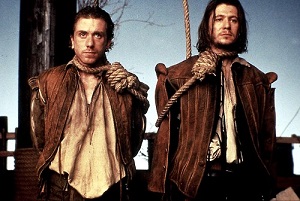
Tom Stoppard (Zlín, 3 juli 1937)
Scene uit een opvoering in Londen, 2016
De Nederlandse schrijfster Andreas Burnier werd op 3 juli 1931 in Den Haag geboren als Catharina Irma Dessaur. Zie ook alle tags voor Andreas Burnier op dit blog.
Uit: De wereld is van glas
„Amsterdam, 17 juli
Dear unknown Rabbi,
Met een Engelse aanhef richt ik mij tot u, omdat Engels het Aramees is van deze tijd: de wereldtaal van de moderne mensheid.
Voor joden was en is het klassieke Hebreeuws natuurlijk de heilige taal, zoals het Sanskriet voor Hindoes, het Latijn voor ro-meins-katholieke christenen, het klassiek-Arabisch voor moslims. Maar wij Ioden, dat hoef ik u als moré natuurlijk niet te vertellen, hebben na en naast het klassieke Hebreeuws ons in de oudheid beholpen met Aramees voor de dagelijkse omgangstaal en voor het internationale contact van ons over de wereld verspreide volk.
Vanaf de middeleeuwen communiceerden wij voor lokaal gebruik in de diaspora en voor correspondentie meestal in Europese joodse dialecten: Iiddisch voor de Asjkenaziem, Ladino voor de Sefardiem, om het nu even niet al te ingewikkeld te maken door ook nog van Iudeo-Arabisch, Iudeo-Italiaans en dat soort bijkomstigheden te reppen. Nu is het Engels de taal bij uitstek geworden voor ons internationale contact. Desondanks schrijf ik u in deze late tijd van de twintigste eeuw in de enige taal die ik werkelijk beheers – een Nederduits dialect vrees ik, als je het technisch bekijkt – met slechts een aanhef in het Engels. Misschien zal iemand die mijn moedertaal met haar mini-bereik toevallig heeft geleerd en die u toevallig kent, u op mijn poging tot toenadering tot u willen attenderen.
Laat ik beginnen, eerwaarde Rabbi, aan u die dat misschien allang weet, te vertellen dat ik rond mijn zestigste levensjaar ben begonnen mijzelf Tenach-Hebreeuws te leren lezen.”
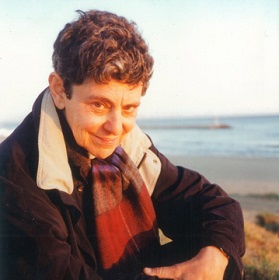
Andreas Burnier (3 juli 1931 – 18 september 2002)
De Amerikaanse humoristische schrijver, columnist en bestsellerauteur David Barry, Jr werd geboren op 3 juli 1947 in Armonk, New York. Zie ook alle tags voor David Barry op dit blog.
Uit: Live Right and Find Happiness
“Looking back, think my parents had more fun than I did.
That’s not how it was supposed to be. My parents belonged to the Greatest Generation; they grew up in hard times. My mom was born in Colorado in an actual sod hut, which is the kind of structure you see in old black-and-white photographs featuring poor, gaunt, prairie-dwelling people standing in front of what is either a small house or a large cow pie, staring grimly at the camera with the look of people who are thinking that their only hope of survival might be to eat the photographer. A sod hut is basically a house made out of compressed dirt. If you were to thoroughly vacuum one, it would cease to exist.
My mom, like my dad, and millions of other members of the Greatest Generation, had to contend with real adversity: the Great Depression, the Dust Bowl, hunger, poverty, disease, World War II, extremely low-fi 78 rpm records and telephones that—incredible as it sounds today—could not even shoot video.
They managed to overcome those hardships and take America to unprecedented levels of productivity and power, which is why they truly are a great generation. But they aren’t generally considered to be a fun generation. That was supposed to be their children—my generation, the Baby Boomers.
We grew We grew up in a far easier time, a time when sod was strictly for lawns. We came of age in the sixties and seventies, the era of sex, drugs and rock and roll. We were cool, we were hip, we were groovy, man. We mocked the suit-wearing Establishment squares grubbing for money in their 9-to-5 jobs. That was not for us. We did our own thing, you dig?
We raised our consciousness. We tuned in, turned on and dropped out. We lived in communes. We went to Woodstock.
We had strobe lights and lava lamps. We wore bell-bottom trousers, and we did not wear them ironically.”
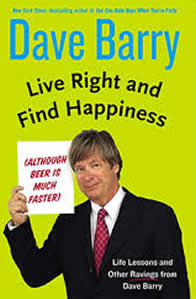
David Barry (Armonk, 3 juli 1947)
Cover
De Welshe dichter en schrijver William Henry Davies werd op 3 juli 1871 in Newport, Monmouthshire, geboren. Zie ook alle tags voor William Henry Davies op dit blog.
A Plain Life
No idle gold — since this fine sun, my friend,
Is no mean miser, but doth freely spend.
No prescious stones — since these green mornings show,
Without a charge, their pearls where’er I go.
No lifeless books — since birds with their sweet tongues
Will read aloud to me their happier songs.
No painted scenes — since clouds can change their skies
A hundred times a day to please my eyes.
No headstrong wine — since, when I drink, the spring
Into my eager ears will softly sing.
No surplus clothes — since every simple beast
Can teach me to be happy with the least.
Money
When I had money, money, O!
I knew no joy till I went poor;
For many a false man as a friend
Came knocking all day at my door.
Then felt I like a child that holds
A trumpet that he must not blow
Because a man is dead; I dared
Not speak to let this false world know.
Much have I thought of life, and seen
How poor men’s hearts are ever light;
And how their wives do hum like bees
About their work from morn till night.
So, when I hear these poor ones laugh,
And see the rich ones coldly frown—
Poor men, think I, need not go up
So much as rich men should come down.
When I had money, money, O!
My many friends proved all untrue;
But now I have no money, O!
My friends are real, though very few.
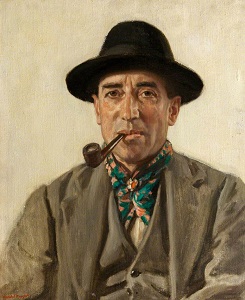
William Henry Davies (3 juli 1871 – 26 september 1940)
Portret door Harold Knight, 1916
De Engelse dichter en schrijver Edward Young werd geboren op 3 juli 1683 in Upham, Hampshire. Zie ook alle tags voor Edward Young op dit blog.
The Complaint: or Night Thoughts (fragment)
And bare existence, man, to live ordain’d,
Wrings, and oppresses with enormous weight.
And why? since time was given for use, not waste,
Enjoin’d to fly; with tempest, tide, and stars,
To keep his speed, nor ever wait for man;
Time’s use was doom’d a pleasure: waste, a pain;
That man might feel his error, if unseen:
And, feeling, fly to labour for his cure;
Not, blundering, split on idleness for ease.
Life’s cares are comforts; such by Heaven design’d;
He that has none, must make them, or be wretched.
Cares are employments; and without employ
The soul is on a rack; the rack of rest,
To souls most adverse; action all their joy.
Here then, the riddle, mark’d above, unfolds;
Then time turns torment, when man turns a fool.
We rave, we wrestle, with great Nature’s plan;
We thwart the Deity; and ’tis decreed,
Who thwart his will shall contradict their own.
Hence our unnatural quarrels with ourselves;
Our thoughts at enmity; our bosom-broils;
We push Time from us, and we wish him back;
Lavish of lustrums, and yet fond of life;
Life we think long, and short; death seek, and shun;
Body and soul, like peevish man and wife,
United jar, and yet are loth to part.
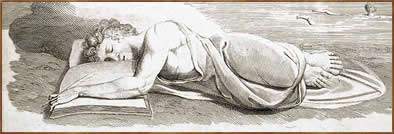
Edward Young (3 juli 1683 – 5 april 1765)
Illustratie door William Blake, 1797
Zie voor nog meer schrijvers van de 3e juli ook mijn vorige blog van vandaag.

1 thoughts on “Tom Stoppard, Andreas Burnier, David Barry, William Henry Davies, Edward Young”
De commentaren zijn gesloten